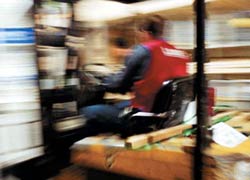 AITT, ITSSAR, NPORS and RTITB created the ABA to contribute to the reduction in workplace transport incidents. |
The Accrediting Bodies Association - Workplace Transport (ABA) has been formally established after founder members signed the membership agreement and committed to the ABA Code of Practice this month.
The ABA was conceived to improve standards and bring clarity to accreditation after the UK Health & Safety Executive (HSE) decided in 2012 to step back from the day-to-day management of the accrediting bodies in workplace transport training. The HSE will work with ABA in a consultative capacity.
The Health & Safety Laboratory (HSL), a HSE agency working with public and private organisations to minimise health and safety risks in the workplace, will help to maintain the standards that will make the ABA a valuable body in the industry.
Founding members AITT, ITSSAR, NPORS and RTITB created ABA to contribute to the reduction in workplace transport incidents and help employers improve productivity and profitability through training.
Membership is open to all workplace transport training accrediting bodies. Companies interested to join will be required to follow a clear code of practice aimed at maintaining high training standards. The ABA's Code of Practice will be available to download from the ABA's
website.
Fork Lift Truck Association CEO Peter Harvey, who has accepted an invitation to serve on the ABA's Appeals Panel, says his association is "extremely supportive of the ABA, and, indeed, any organisation that is actively working to improve our industry's safety record.
"Operators will reap the greatest benefits of this development, so we are working to keep them abreast of the changes underway and what it will mean - in practical terms - for them.
"In recent years, representatives from the ABA have kept fork truck users updated with informative sessions at our National Fork Truck Safety Conference."
Information about ABA's founding members:AITT
The AITT was formed in 1985 and became an HSE-recognised body deemed competent to accredit training organisations and individuals in 1991. It specialises in workplace transport and specifically any and all types of forklift trucks and related materials handling equipment.
ITSSAR
ITSSAR was established in 1991. Its sole function is to write and monitor training standards for a broad range of mechanical handling equipment including construction plant, crane operation, lifting and rigging operations, and slinging and signalling.
NPORS
Established in 1992, the National Plant Operators Registration Scheme is now one of the UK's leading accreditation and registration bodies, working in the industrial, construction, utilities, warehousing and distribution, agricultural, ports and marine sectors.
RTITB
RTITB (formerly the Road Transport Industry Training Board) works with the transport, warehousing and logistics industries by providing the tools to train people. RTITB's key aim is to significantly reduce risk in the industries with which it works. RTITB currently accredits over 600 sites around the UK and Ireland and issues over 65,000 training certificates per year.